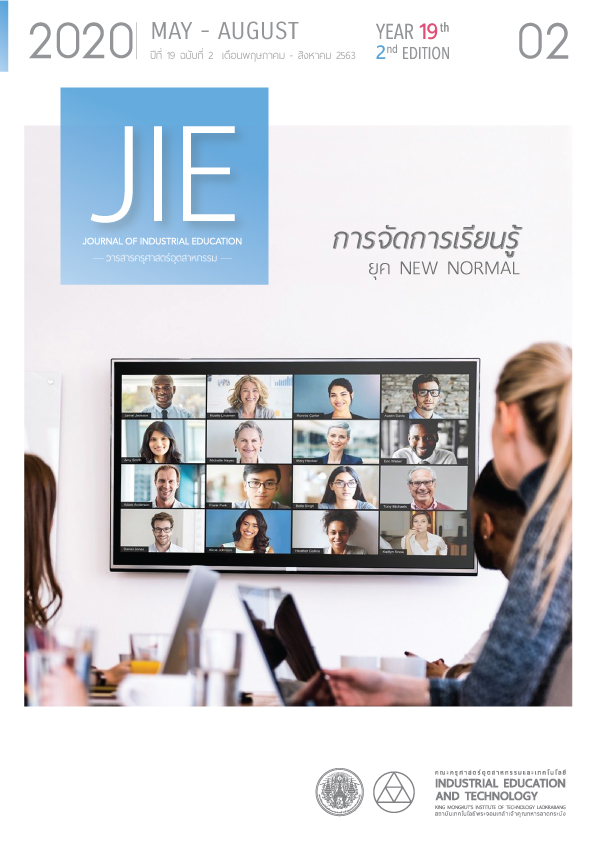THE EFFECT OF USING CHATBOT IN BLENDED LEARNING FOR VOCATIONAL CERTIFICATE STUDENTS IN THE COLLEGES UNDER THE INSTITUTE OF VOCATIONAL EDUCATION NORTHEASTERN REGION 1
Keywords:
Chatbot, Learning Achievement, Working Memory, Vocational Certificate StudentsAbstract
This research is experimental research aimed to study the effect of using chatbot in blended learning. The chatbot was used to present and review studying content. Students can do exercises via the chatbot in order to increase the learning achievement. It is a text-based conversational chatbot with teenager personality and was designed to be easily accessible via the Facebook Messenger. It uses Natural Language Processing (NLP) to translate conversational messages into the intents according to the conversational context. The experimental designs were Pretest Posttest Control Group Design used to compare the learning achievement of students, and Static Group Comparison Design used to compare the working memory of students. The Population was vocational certificate students in the colleges under the Institute of Vocational Education Northeastern Region 1. The 2 classrooms of samples were firstly selected using clustering random sampling method, then 60 divided into 2 groups, namely the experimental group consisting of 30 students learning with blended learning using the chatbot, and the control group consisting of 30 students learning with traditional method. The content was the Basic Hydrocarbon Compounds in the Science for Life Skills Development course. The research instruments consisted of the chatbot for blended learning, the achievement test, and the students’ working memory test. The data were analyzed using the mean and standard deviation. The differences of the learning achievement and the students' working memory of both groups were compared using independent sample t-test statistics. The results showed that the learning achievement and the working memory of the experimental group were significantly higher than the control group at a statistical level of .01.
References
Office of the Vocational Education Commission. 2019. The 2019 Curriculum for Certificate of Vocational Education. Retrieved May 5, 2020, from https://bsq.vec.go.th/
Peera Wongupparaj and RangsiratWongupparaj. 2016. 39 Years of Working Memory Model: Research and Its Application. Research Methodology and Cognitive Science, 10(2), p. 1–16.
Buranee Rabiab and Suchada Kornpetpanee. 2016. The Development of an Arithmetic Training Program Based on The Triple Code Model for Improving Working Memory among Grade One Students. Research Methodology and Cognitive Science, 14(2), p. 102–113.
Sanit Srikoon and Ketsaraphan Punsrigate Khonjaroen . 2020. The Investigation of Working Memory Influencing on Mathematics Achievement. Journal of Arts Management, 4(1), p. 139-150.
BRAIN [BRN.AI] CODE FOR EQUITY. 2019. Chatbot Report 2019: Global Trends and Analysis. Retrieved April 22, 2020, from https://chatbotsmagazine.com/chatbot-report-2019-global-trends-and-analysis-a487afec05b
Shawar, B. A. and Atwell E. 2007. Chatbots: Are They Really Useful?. LDV Forum, 22(1), p. 29–49.
Sunisa Sornkaew. 2018. Chatbot Technology Adoption in Banking Business. Master of Business Administration, Faculty of Commerce and Accountancy, Thammasat University.
Molnár, G. and Szuts, Z. 2018. The Role of Chatbots in Formal Education. In Proceedings of IEEE 16th International Symposium on Intelligent Systems and Informatics (p. 197-201). Subotica, Serbia: (n.p.).
Hien, H. T. et al. 2018. Intelligent Assistants in Higher-Education Environments: The FIT-EBot,
a Chatbot for Administrative and Learning Support. In Proceedings of the Ninth International Symposium on Information and Communication Technology (p. 69–76). Da Nang, Vietnam: (n.p.).
Clarizia, F. et al. 2018. Chatbot: An Education Support System for Student. In Cyberspace Safety and Security. In Proceedings of 10th International Symposium on Cyberspace Safety and Security (p.291-302). Cham: Springer International Publishing.
Holotescu, C. 2016. MOOCBuddy: A Chatbot for Personalized Learning with MOOCs. In Proceedings of RoCHI 2016 (p. 91-94). (n.p.).
Colace, F. et al. 2018. Chatbot for E-Learning: A Case of Study. International Journal of Mechanical Engineering and Robotics Research, 7(5), p. 528–533.
Engati. 2019. Chatbot Applications in Education. Retrieved March 11, 2020, from https://medium .com/@getengati /chatbot-applications-in-education-bb836c09c6d3
Gill, M. 2019. 5 Ways Artificial Intelligence and Chatbots Are Changing Education. Retrieved April 2, 2020, from https://towardsdatascience.com/5-ways-artificial-intelligence-and-chatbots-are-changing-education-9e7d9425421d
Heller, B. et al. 2005. Freudbot: An Investigation of Chatbot Technology in Distance Education. In Proceedings of EdMedia + Innovate Learning 2005 (p. 3913-3918), Canada: Association for the Advancement of Computing in Education (AACE).
Jia, J. and Ruanm, M. 2008. Use Chatbot Csiec to Facilitate the Individual Learning in English Instruction: A Case Study. In International Conference on Intelligent Tutoring Systems (p.706-708). (N.P.): Springer.
Pham, X. L. et al. 2018. Chatbot as an Intelligent Personal Assistant for Mobile Language Learning. In Proceedings of the 2018 2nd International Conference on Education and E-Learning, ICEEL 2018 (p.16-21). New York, USA: Association for Computing Machinery.
Benotti, L. et al. 2014. Engaging High School Students Using Chatbots. ITICSE 2014 - Proceedings of the 2014 Innovation and Technology in Computer Science Education Conference, p. 63-68.
Fryer, L. K. et al. 2017. Stimulating and Sustaining Interest in a Language Course: An Experimental Comparison of Chatbot and Human Task Partners. Computers in Human Behavior, 75, p. 461–468.
Song, D. et al. 2019. Participation in Online Courses and Interaction With a Virtual Agent. International Review of Research in Open and Distributed Learning, 20(1), p. 43-62.
Abbasi, S. and Hameedullah K. 2014. Measuring Effectiveness of Learning Chatbot Systems on Student’s Learning Outcome and Memory Retention. Asian Journal of Applied Science and Engineering, 3(2), p. 251–260.
Fryer, L. K. et al. 2019. Chatbot Learning Partners: Connecting Learning Experiences, Interest and Competence. Computers in Human Behavior, 93, p. 279–289.
Ruan, S. et al. 2019. QuizBot: A Dialogue-Based Adaptive Learning System for Factual Knowledge. In Proceedings of the 2019 CHI Conference on Human Factors in Computing Systems (p. 1–13). Scotland, UK: (n.p.).
Monchai Tiantong. 2012. Research Methodology in Computer Education. Bangkok: King Mongkut’s University of Technology North Bangkok.
Downloads
Published
How to Cite
Issue
Section
License
"The opinions and contents including the words in papers are responsibility by the authors."
"ข้อคิดเห็น เนื้อหา รวมทั้งการใช้ภาษาในบทความถือเป็นความรับผิดชอบของผู้เขียน"



